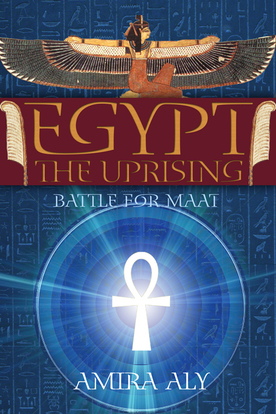Books:
- Egypt: The Uprising
Description of the book:
A debut novel like no other-- touches on the apocalyptic flavors of the times and tells of a history that transcends the past.
Why is the Arab world in turmoil? What instigated the Spring of Freedom?
There is more to the story than meets the eye...
The very fabric of the world is at stake.
And , believe it or not, your fate lies in the hands of one book-loving Egyptian teen with an extraordinary heritage .
Aya is an Egyptian teenage girl trying to mind her own business and take care of her brother. As their country is swept by the tides of a revolution against a tyrant nicknamed the vile pharaoh, Aya tries to stay adrift. But her blood has something different in store for her.
Learning what the Ancients have always known, She joins a battle for truth and freedom-- a battle for Ma'at.
It is not just a story, however, it is a world-within-world, and a fresh tantalizing outlook on the events in our modern events.
This elegant novella is an introduction to a multi-volume series... The Battle for Maat
Why is the Arab world in turmoil? What instigated the Spring of Freedom?
There is more to the story than meets the eye...
The very fabric of the world is at stake.
And , believe it or not, your fate lies in the hands of one book-loving Egyptian teen with an extraordinary heritage .
Aya is an Egyptian teenage girl trying to mind her own business and take care of her brother. As their country is swept by the tides of a revolution against a tyrant nicknamed the vile pharaoh, Aya tries to stay adrift. But her blood has something different in store for her.
Learning what the Ancients have always known, She joins a battle for truth and freedom-- a battle for Ma'at.
It is not just a story, however, it is a world-within-world, and a fresh tantalizing outlook on the events in our modern events.
This elegant novella is an introduction to a multi-volume series... The Battle for Maat
***
Describe your book in 3
words.
Unique
layered adventure.
As
a matter of fact, I took the three words most reported by reviewers for that
one.
When did
you decide to write Egypt: The Uprising?
Aya
, my protagonist, and Ma'at were initially going to be featured in a
post-apocalyptic novel set in a near future Egypt where the Nile Delta drowns
because of the rising sea levels. This novel would have had an environmental ,
green, twist to it.
I
wanted to write about a post apocalyptic Egypt because I felt that a sense of
impending doom was hovering around the country with all the injustice people
were suffering from.
I
felt that I no longer needed the apocalyptic setting. The renewed sense of hope
set forth by the revolution took over the story. Ma'at, goddess of justice,
would surely help out the revolutionaries oust the shadowy figures.
When
I heard of the looting of the Egyptian Museum in Cairo on the night of
January 28th 2011, I knew that I found a nugget to build my story on.
How is Egyptian Mythology differing from Greek
Mythology?
Greek
mythology somehow "survived" through oral tradition, poems and
ballads, and, of course, through Greek literature.
Ancient
Egyptian mythological accounts have been put together from translating glyphs.
Considering that the Rosetta stone has been deciphered only a couple of
centuries back in the early 1800s . This is not very far back, given the
intricate effect Greek mythology has had on the modern world. Most of the
information we had about Egyptian mythology prior to the translations came from
Greek and Roman thinkers, like Plato.
We
have really not had that much time to mull over Egyptian mythology. A lot is
missing and much of the information we have is fragmented.
Something
as simple as the name for the god 'Horus' is not entirely figured out. Horus,
Hrw or Hr, is not just a name. It's a catch-all term for a bunch of deities.
One of them is involved in a creation myth, another is seen as the brother of
Osiris, and the most famous is Hr as the son of Osiris and Isis.
Confusing, eh? Well there is lots more where that came from.
I
think that this renders Egyptian mythology to alternate explanations and makes
it all the more exciting.
In your book, why didn’t
you mention Mubarak, instead of Mubasher?
Oh,
I am just following in the footsteps of my ancestors here. Ancient Egyptians
believed names to be sacred and to them the utmost insult was to erase a
person's name from history.
And
so I did not want to commemorate Mubarak by putting his name down in my novel
as it were. I called him Saye' (Arabic for bad) Mubasher (
directly, or as I meant it here straight-out.)
What is the message you're
trying to deliver from writing Egypt: The Uprising?
I believe that nothing sums up the message better than Aya' s closing
sentences:
" I am writing to you because I wanted to get the word
out. That our world is not at all what it seems. It is infinitely more
beautiful and poetic and just. And one day, I am sure, one day Ma’at will be
restored. And tyrants will fall and, eventually, we will overcome."

No comments:
Post a Comment